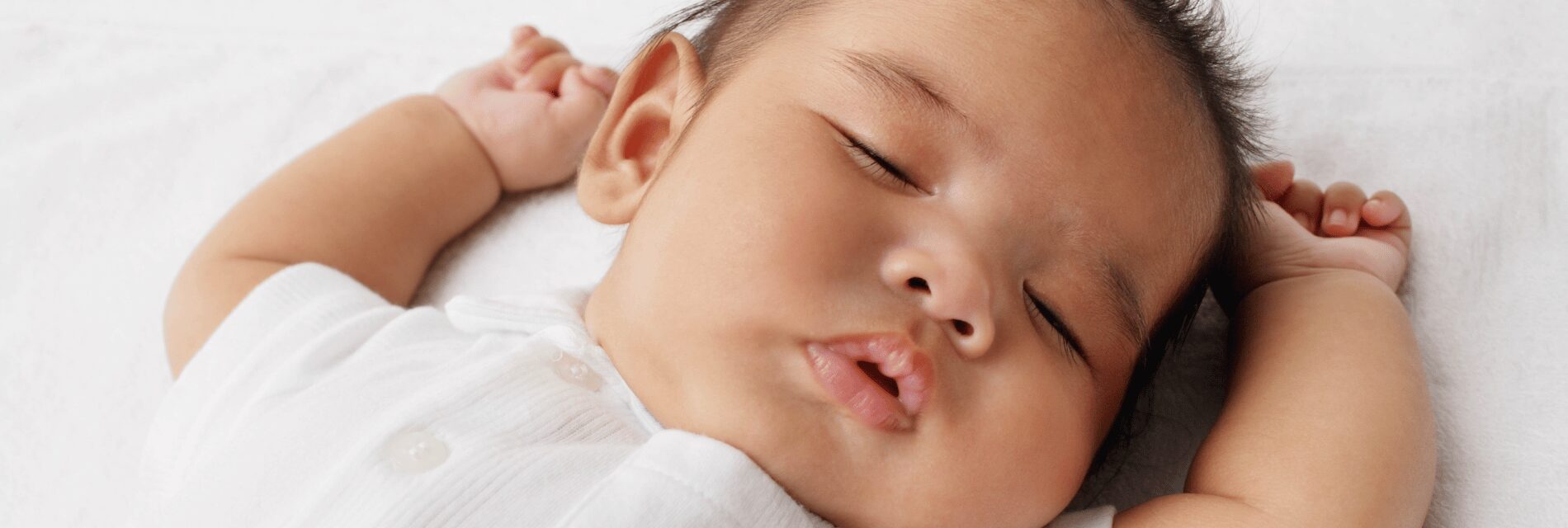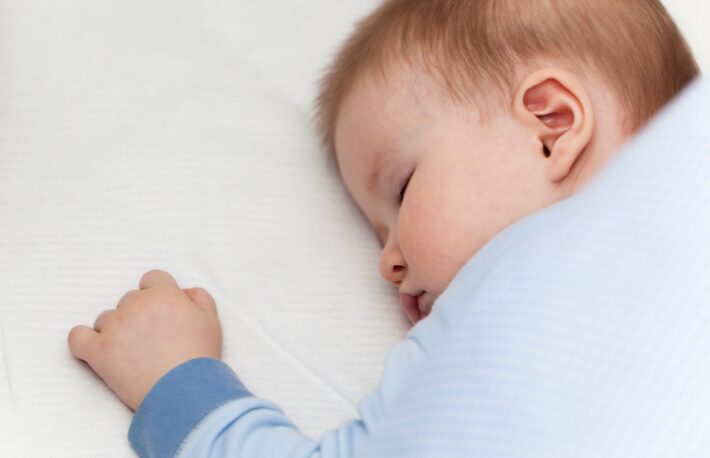
8 Month Sleep Regression: No, Your Baby Is Not The Only One In The Lot!
There is nothing more valuable to new parents than a good night’s sleep. We guess you have pretty much gone through the extreme lengths of creating a bedtime and nap routine for everyone in the house to get their well-deserved sleep. While your baby grows old, you may think that they have gone past the age of keeping you up at night? Well, we wouldn’t say that. It is pretty common for babies to go through an 8 month sleep regression. These regressions are dangerous and can adversely impact how everyone gets to sleep at home.
On the better side, it is a relief to know that sleep regressions won’t last forever. So, if you are also struggling with your baby’s 8 month sleep regression, we have certain information that you would want to read. Maybe some of our tips can help you figure out a better way to deal with your child’s sleep regression and help everyone else in the house get some solid sleep.
What Is An 8 Month Sleep Regression?
To begin with, the infamous 8 month sleep regression is a period of time when an infant who has been sleeping pretty well experiences poor sleep. Sleep regressions may come with shorter naps, too much fussiness during bed or naptime, constantly fighting sleep, and waking up frequently at night.
There are multiple ages where sleep regressions are common, like four, eight, fifteen, and eighteen months. While there are other issues that may also disturb your little one’s sleep, you will be able to draw a clear line of difference between sleep regression and sleep disturbances. The differences mainly depend on when it is happening, how long it is lasting, and if there are any other issues.
Just because sleep regression happens to some babies does not mean it will happen to yours too. If your kid has reached the age of eight months and is not fighting to sleep, congratulations! You are God’s chosen one. We will just be sitting here sipping tea, wondering where we did it wrong.
What Are The Causes Of 8 Month Sleep Regression?

Developmental changes are mainly responsible for the 8 month sleep regression. Some of the most prominent changes in your baby that are causing them to fight against sleep are:
Talking
At this age, most babies start to babble. And this is more than their usual baby noises. They will take the house by storm with everything that they have to say. You may sometimes even get to hear a small “mama” or “dada” during their babbling sessions. While this is exciting for new parents, it is better to avoid it, particularly during their 8 month sleep regression, hoping that they’ll get back to sleep as early as possible.
Crawling
Your little 8 month old’s physical skills keep on getting better with each passing day. They may even start to practice all their advanced moves like crawling, scooting, pulling up, or creeping. And there is a good chance that they are just trying to practice it at night, too. While practicing is indeed a great habit, doing it at night might not be the best thing to do, at least for the sake of parents.
Separation Anxiety
8 might sleep regression might also have some connection with your baby’s social steps. Separation anxiety, which is fairly common during this age, may be accompanied by lots of crying. Babies usually start experiencing separation anxiety somewhere between 8 to 10 months. This may mainly show up when their parents leave the room or go somewhere without taking them. Your baby may also experience sleep regression when at the time of sleeping when you just put them in their crib and leave the room.
Teething
Teething is a common process at this age. And while it is one of the major developments in their body, it does get quite uncomfortable for babies to deal with it. If your baby is suddenly making it difficult for you to put them to bed or does not sleep at 8 months of age, teething can be one reason. It is understandable that the baby cannot sleep because of the pain from their emerging tooth.
How Long Does 8 Month Sleep Regression Last?
The news is nothing but relief that 8 month sleep regression is temporary. Getting through this period of lack of sleep just requires the newness of the baby’s emotions or skills to wear off. Once that happens, your child’s sleeping pattern will get back to normal.
So, if you have sleep-trained your baby well, they will likely get back to their old patterns and get back to sleep without creating too much fuss.
And if you need to sleep, train them once again; that is fine as well. It is any day better than having to deal with a crying, fussy baby every night.
Sings That Your Baby Is Going Through 8 Month Sleep Regression

While there is a good chance that you might confuse your kid’s fussiness with sleep regression, they are not the same. Being fussy during sleep time is just a mere habit; sleep regression, on the other hand, is a full phase. This means it will last way longer than fussiness.
Some clear signs that your baby is experiencing 8 month sleep regression include:
Crankiness
Your baby will start getting too cranky because of their lack of sleep. At this age, kids need a minimum of 12 to 16 hours of sleep, with at least 10 to 12 hours of sleep at night. When they do not get the amount of sleep that their body needs, they tend to stay irritated throughout the day.
Frequent Waking Ups At Night
If your baby has been sleeping well enough before and suddenly is waking up more than usual, this can be a good sign that they are going through a sleep regression.
Restless Sleeping Pattern And Trouble Falling Asleep
If you see that it has suddenly become more difficult for you to settle down with your little one and that they move too much in their sleep, it could be a sign that they are going through their regressive phase.
Clinginess
If your baby has been experiencing 8 month sleep regression, they might act a little upset when they do not see you around. You may also see them hold you a little too tight when you are around.
More Sleep During The Daytime
Sleeping too much during the day is pretty normal for a baby who is going through a sleep regression at night. This gets particularly noticeable when your baby initially does not have the habit of sleeping at night.
Expert Tips To Deal With Your Baby’s 8 Month Sleep Regression

We know the pain of staying up the whole night with a crying baby by your side. No matter what you do, they just do not want to fall asleep. In fact, most of the time, you do not even know what to do because everything you already knew went in vain.
But worry not. Instead of hopelessly being on the internet to find just one way to make the baby sleep, you can refer to some of our expert tips and see if your baby finally sleeps at night.
Offer Them Some Additional Comfort
You might have to offer them some additional comfort if you see them having trouble sleeping at night. However, you need to keep in mind that these newer habits that include more parental help may develop into long-lasting habits. This may also negatively impact the sleeping pattern, which naturally occurs during this phase.
For instance, if your baby falls asleep without any help from you, rocking or patting them a bit more might help them fall asleep during this phase. But, if you keep rocking or patting them till the time they fall asleep, it will develop into a habit. This habit will go on more than you prefer and cause sleep disruptions than sleep regression.
Follow Wake Windows As Per Their Age
Make sure to get your baby in bed before they get too tired to fall asleep. Over-exhaustion does not allow the baby to fall asleep calmly. Depending on their age, they will probably need 2 to 3 hours of awake time in between their sleeping periods.
Think About Sleep Training
Introducing and maintaining independent sleep skills as much as you can might limit how much impact regression has on your baby’s sleep. If you keep on helping your baby to fall asleep every time, they will tend to wake up even more at night and have shorter naps. Helping them learn to fall asleep on their own improves their quality of sleep. This is particularly important when your baby is experiencing the 8 month sleep regression. There are multiple ways to practice sleep training with your baby. Gradually try out each of them to see which one works best for your little one.
Give Them Practice Time For Their New Skills
In most cases, babies learn new skills at this age, which keeps them up at night to practice. While practicing is a good thing, doing it in the middle of the night does not sound feasible. But they certainly do not have the capability to figure that out, so you would have to do that for them. Make sure that your baby gets enough time during the day to practice all their newly learned skills. This will make them content enough, and they will certainly not want to practice it during sleep time.
Give Your Baby Some Space To Wind Down
Even when you give them a lot of extra time to practice their newly learned skills during the day, there is still a chance that they would want to practice it during their nap time. This is very common and is appropriate for their development. If your baby keeps playing instead of sleeping, it is better to try a sleeping technique where they have some time to wind down on their own. Using 10 minutes of your time in between your attempts to make them fall asleep is a far better way than laying down only for them to get up once again.
What Are The Sleep Needs For An 8-Month-Old Baby?
While babies during this age have shifting sleeping patterns, it is still very important that they maintain a schedule to get enough sleep throughout the day. While every baby is different and so is their sleeping need, in general terms, an 8 month old would need around 12 to 15 hours of sleep in a full 24 hour period.
Again, this might be different for every baby, an 8 month old would necessarily sleep for 10 to 11 hours straight at night, maybe with one or two feeds in the middle. During the day, they may sleep for around 2 to 4 hours. However, this pattern may get easily disrupted if your baby is going through a sleep regression.
Some babies tend to sleep for longer at night and shorter during the day. On the other hand, others may take shorter naps at night and sleep for too long during the day.
Frequently Asked Questions
No, it is not. Because some babies experience it and others do not, we cannot necessarily term it as a myth.
Every baby experiences different 8 month sleep regression patterns. While some babies skip it entirely, others may certainly not. There are multiple factors that trigger sleep regression in your baby during this age. So, if you see your baby suddenly not sleeping at night, there may be a chance of sleep regression. But in some cases, it might just be simple fussiness.
Yes, it is absolutely normal for babies to not skin on their 8 month sleep regression phase. You may just consider yourself lucky if your child doesn’t go through it.
The Bottom Line
8 month sleep regression is a phase when babies suddenly fight sleeping and stay up for as long as possible at night. This is a common habit, and there are multiple reasons that trigger it. From teething to learning new activities, anything can make your baby want to stay up at night.
But there is nothing to worry about as the 8 month sleep regression is not permanent. It goes away as soon as your baby gets accustomed to the new developmental changes in their body.
RECOMMENDED READING:
Leave a Reply
All Comments
Already have an account?
Sign In
Create your account
User added successfully. Log in










19th June, 202425 July 2023 at 10:08 AM |
Your writing has a way of resonating with me on a deep level. I appreciate the honesty and authenticity you bring to every post. Thank you for sharing your journey with us.